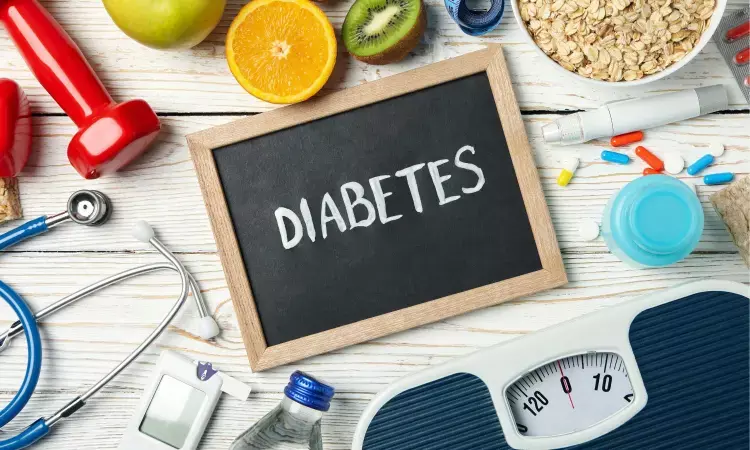- Home
- Medical news & Guidelines
- Anesthesiology
- Cardiology and CTVS
- Critical Care
- Dentistry
- Dermatology
- Diabetes and Endocrinology
- ENT
- Gastroenterology
- Medicine
- Nephrology
- Neurology
- Obstretics-Gynaecology
- Oncology
- Ophthalmology
- Orthopaedics
- Pediatrics-Neonatology
- Psychiatry
- Pulmonology
- Radiology
- Surgery
- Urology
- Laboratory Medicine
- Diet
- Nursing
- Paramedical
- Physiotherapy
- Health news
- Fact Check
- Bone Health Fact Check
- Brain Health Fact Check
- Cancer Related Fact Check
- Child Care Fact Check
- Dental and oral health fact check
- Diabetes and metabolic health fact check
- Diet and Nutrition Fact Check
- Eye and ENT Care Fact Check
- Fitness fact check
- Gut health fact check
- Heart health fact check
- Kidney health fact check
- Medical education fact check
- Men's health fact check
- Respiratory fact check
- Skin and hair care fact check
- Vaccine and Immunization fact check
- Women's health fact check
- AYUSH
- State News
- Andaman and Nicobar Islands
- Andhra Pradesh
- Arunachal Pradesh
- Assam
- Bihar
- Chandigarh
- Chattisgarh
- Dadra and Nagar Haveli
- Daman and Diu
- Delhi
- Goa
- Gujarat
- Haryana
- Himachal Pradesh
- Jammu & Kashmir
- Jharkhand
- Karnataka
- Kerala
- Ladakh
- Lakshadweep
- Madhya Pradesh
- Maharashtra
- Manipur
- Meghalaya
- Mizoram
- Nagaland
- Odisha
- Puducherry
- Punjab
- Rajasthan
- Sikkim
- Tamil Nadu
- Telangana
- Tripura
- Uttar Pradesh
- Uttrakhand
- West Bengal
- Medical Education
- Industry
Elderly diabetes patients not meeting recommended micronutrient intake and are at risk of malnutrition

Type 2 diabetes (T2D) is a major health burden affecting a quarter of the population over 65. The cornerstone of treatment includes lifestyle modification, proper nutrition, regular physical activity, and pharmacological intervention. Evidence suggests that malnutrition is higher in older adults with T2D.
A recent study published in Clinical Nutrition ESPEN has highlighted that a very low proportion of older adults with a history of T2D meet the recommendations for ten micronutrients, including calcium, magnesium, potassium, selenium, riboflavin, vitamin D, E, and B6, folate, and niacin with an unsatisfactory Mediterranean diet adherence.
There needs to be more data on micronutrient intake in older adults with T2D and their adherence to the Mediterranean diet, a dietary pattern rich in micronutrients. In this cross-sectional study, researchers evaluated the prevalence of adequacy in micronutrient intake and adherence to the Mediterranean diet in T2D older adults in 138 patients, including 47 women and 91 men with T2D aged over 65 years.
Three 24-hour dietary recalls assessed dietary habits. Comparisons were made between micronutrient intake and dietary recommendations proposed by the Italian Society of Human Nutrition (LARN) and the European Food Safety Agency (EFSA). MEDI-quest score evaluated adherence to the Mediterranean diet.
The key results of this study are:
- 1 % of participants adhered to the recommendations for intake of potassium and vitamin D.
- A low proportion of participants adhered to the recommendations for calcium (∼23%), magnesium (16%), selenium (17%), vitamin E (14%), riboflavin (28%), vitamin B6(29%), folate (25%), and niacin (27%) intake.
- Over 60% of the population adhered to the recommendations for iron, copper, vitamin A and B12 intake.
- Only 53% showed high adherence to the Mediterranean diet.
They said our data indicate that a very low proportion of T2D adults meet the recommendations for ten micronutrients with an unsatisfactory adherence to the Mediterranean diet.
Implementing nutritional approaches and increasing the consumption of foods rich in micronutrients in older adults is imperative.
Study limitations include Cross-sectional design, small sample size, and single-centre study.
Further reading:
Massimino, E., Izzo, A., Castaldo, C., Amoroso, A. P., Rivellese, A. A., Capaldo, B., & Della Pepa, G. (2023). Dietary micronutrient adequacies and adherence to the Mediterranean diet in a population of older adults with type 2 diabetes: a cross-sectional study. Clinical Nutrition ESPEN, 57, 337–345. https://doi.org/10.1016/j.clnesp.2023.07.011
BDS, MDS in Periodontics and Implantology
Dr. Aditi Yadav is a BDS, MDS in Periodontics and Implantology. She has a clinical experience of 5 years as a laser dental surgeon. She also has a Diploma in clinical research and pharmacovigilance and is a Certified data scientist. She is currently working as a content developer in e-health services. Dr. Yadav has a keen interest in Medical Journalism and is actively involved in Medical Research writing.
Dr Kamal Kant Kohli-MBBS, DTCD- a chest specialist with more than 30 years of practice and a flair for writing clinical articles, Dr Kamal Kant Kohli joined Medical Dialogues as a Chief Editor of Medical News. Besides writing articles, as an editor, he proofreads and verifies all the medical content published on Medical Dialogues including those coming from journals, studies,medical conferences,guidelines etc. Email: drkohli@medicaldialogues.in. Contact no. 011-43720751


